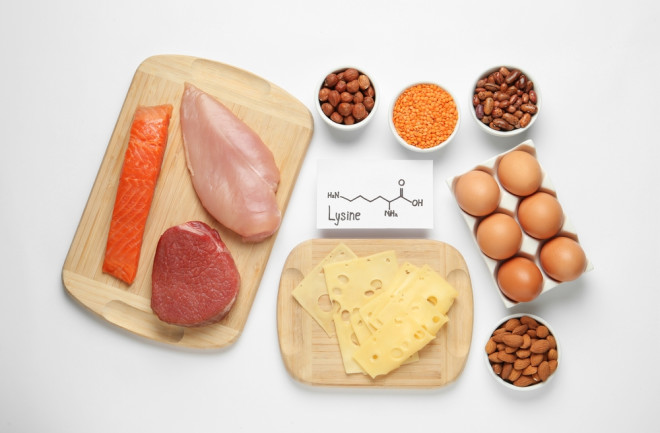Anyone who’s had a biology class probably remembers how important proteins are. Often referred to as the workhorses of the body, proteins exist in every single cell. What do they do? It’s probably fairer to ask: What don’t they do?
They function as a building material within cells; they copy DNA, and they carry messages and oxygen to various parts of the body. In short, protein makes us us: Without it, the structure and function of our tissues and organs simply wouldn’t exist — and neither would we.
But protein itself wouldn’t exist without amino acids. These molecules are critical for making proteins, and our bodies need 20 different kinds of amino acids in order to function properly.
Of these 20, nine amino acids are essential, meaning that our bodies are not capable of manufacturing them. Each of those amino acids is vital in its own way, but today, we’ll spotlight the amino acid known as lysine.
What Is Lysine?
Lysine is important for making protein, of course, especially collagen, which is necessary for the building of healthy bones, muscles, and connective tissue, including skin.
Lysine also aids the body in absorbing certain minerals, especially calcium. It helps break down carbohydrates and fatty acids, and may also play a role in supporting heart health and immune function. In supplement form, you’ll see it listed on the label as L-lysine.
Read More: Why Do I Get Sick So Often, While Others Stay in Freakishly Good Health?
What Are the Health Benefits of Lysine?
Lysine provides us with some of the basic building blocks we need to exist, and it may also have some additional health benefits.
Bone Health
Because lysine has been shown to help the body better absorb and retain calcium, some researchers believe lysine may help prevent bone loss associated with aging and osteoporosis.
Heart Health
Although more research is needed, some evidence suggests that taking lysine supplements may help lower blood pressure in individuals with suboptimal lysine intake.
Virus Blocking
Lysine may have antiviral properties, especially when it comes to herpes. Although it remains a contentious area of study, some research has demonstrated that lysine at doses above 1 gram per day may prevent the outbreak of mouth sores and cold sores.
Mental Health
Some human and animal studies suggest that lysine, or a combination of L-lysine and L-arginine, may play a role in decreasing stress and anxiety. Lysine may also help to treat patients with serious mental health issues, such as schizophrenia.
Read More: Therapy on a Plate: How Your Diet Can Benefit Your Mental Health
Unraveling the Lysine Contingency
You don’t see a lot of amino acids getting a shout-out in popular culture, but movie trivia buffs and fans of the Jurassic Park franchise may recall something called “the lysine contingency,” a genetic failsafe engineered into the fictional park’s dinosaurs. The claim was that the dinosaurs were unable to produce lysine, and so would rely on park staff to supply them with lysine in supplement form.
According to the plan, if ever a dinosaur escaped the confines of the park, it would soon die without its regular infusions of this critical amino acid. Spoiler: The plan didn’t work since the herbivorous dinosaurs were able to get enough lysine by foraging for food, and the carnivores got their lysine by eating the foragers.
Read More: Do Multivitamins Work and How Do You Know If You Need One?
What Foods Contain Lysine?
Like those dinosaurs, humans can’t make lysine either, so we also have to get it from our food or in supplement form. Luckily, foods that contain lysine are abundant and include:
Meat
Pretty much all meats are good sources of lysine, including beef, pork, and poultry. Eggs are also a good source.
Seafood
Fish and shellfish also contain the amino acid.
Soy products
Tofu and soy protein, mainly.
Nuts and seeds
Peanuts, cashews, pistachios, and sesame seeds are among the top nut/seed sources.
Read More: 4 Science-Backed Diets to Improve Your Health
Are Lysine Supplements Safe?
While most people get plenty of lysine from the foods they eat, some do choose to take supplements (especially for some of the health problems mentioned earlier, such as cold sore outbreaks). Lysine supplements are generally considered safe for most adults.
Depending on what you’re taking the supplement for, recommended dosages can range anywhere from 500 mg two or three times a day to as much as 3,000 mg per day for up to a year. However, you should not take extra lysine if you suffer from kidney, liver, or gallbladder issues. People who are pregnant or breastfeeding should also avoid supplemental lysine.
No matter what health issue you’re trying to address, talk to your doctor before experimenting with lysine supplements. As beneficial as you think lysine might be, your physician or nutrition expert should be your first call — they can best help you determine a dosage that could effectively meet your health needs.
Read More: It's Tricky to Know Which Supplements Are Safe
Article Sources
Our writers at Discovermagazine.com use peer-reviewed studies and high quality sources for our articles, and our editors review for scientific accuracy and editorial standards. Review the sources used below for this article:
Amino Acids. Tolerable amounts of amino acids for human supplementation: Summary and lessons from published peer-review studies
Biomedical Research. Oral treatment with L-lysine and L-arginine reduces anxiety and basal cortisol levels in healthy Humans
Biomedicine & Pharmacotherapy. Anxiolytic, anti-nociceptive and body weight reducing effects of L-lysine in rats
BMC Medicine. L-lysine as adjunctive treatment in patients with schizophrenia
BMC Nutrition. Effect of lysine supplementation on hypertensive men and women in selected peri-urban community in Ghana
Integrative Medicine: A Clinician’s Journal. Lysine for Herpes Simplex Prophylaxis: A Review of the Evidence
Journal of Bone and Mineral Research. Amino Acid Intakes Are Associated With Bone Mineral Density and Prevalence of Low Bone Mass in Women: Evidence from Discordant Monozygotic Twins
PubChem. Lysine

